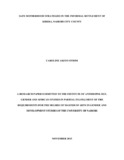| dc.description.abstract | This was a cross sectional, descriptive study exploring safe motherhood strategies in the informal
settlement of Kibera in Nairobi City County. Specifically, the study examined the strategies
adopted by the health facilities and their effectiveness in addressing the constraints faced in
ensuring safe motherhood. The study was guided by Intervention and Solution focused theory
and data collected through key informant interviews, in depth interviews, and observations. The
sample population was drawn from public, private, Faith-based, NGO supported health facilities
as well as a Beyond Zero Clinic within Kibera informal settlements.
Purposive sampling was used to identify the health facilities in Kibera. The study purposively
included facilities run by government (Public) as well as private facilities run by health/medical
entrepreneurs and not for profit facilities run by the church or faith based organizations as well as
those run by non-governmental organizations. In situations where community run facilities
existed, they were included as well as the Beyond Zero Clinic providing maternity services to
Kibera residents. The data was analyzed through constant comparative approach which is
consistent with the grounded theory and presented according to themes informed by the study
objectives.
The study has revealed that the informal settlement facilities have adopted specific strategies in
the delivery of maternal health care services. Among the strategies adopted include: partnerships
with other organizations on provision of a range of services including family planning, ante-natal
care, safe and clean delivery, skilled birth attendants, post-natal care, “delivery pack” to
incentivize the mothers to have facility deliveries and maternal mortality audit meetings. Further,
there is a user fees exemption for maternity services.
The strategies, however, are faced by a number of constraints including: insufficient human and
material resources; ineffectiveness of the referral systems, physical inaccessibility of the
facilities and insecurity. The study concludes that there is an urgent need to address the burden of
shortage of staff, stock-outs of drugs, supplies and commodities and an ineffective referral
system. The study recommends that referral pathways in the informal settlements needs to be
improved and this should be complimented by constant and adequate supply of essential
medicines and equipment and monetary resources. | en_US |

